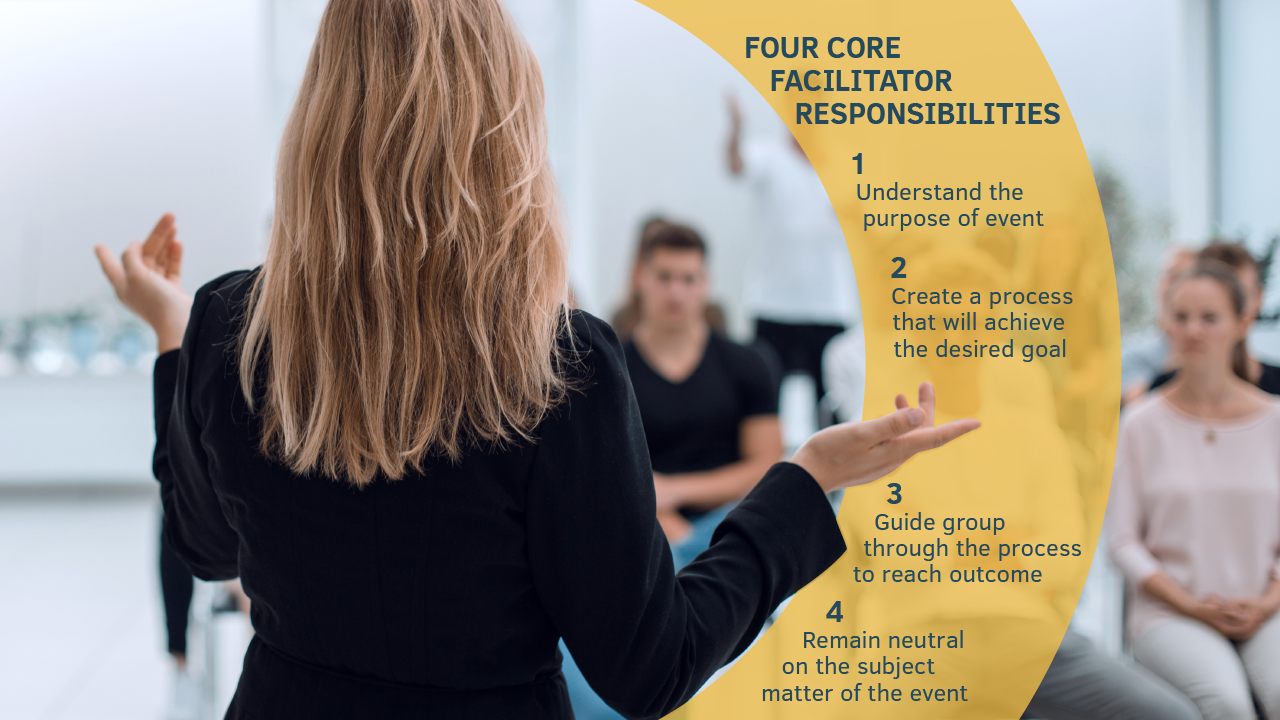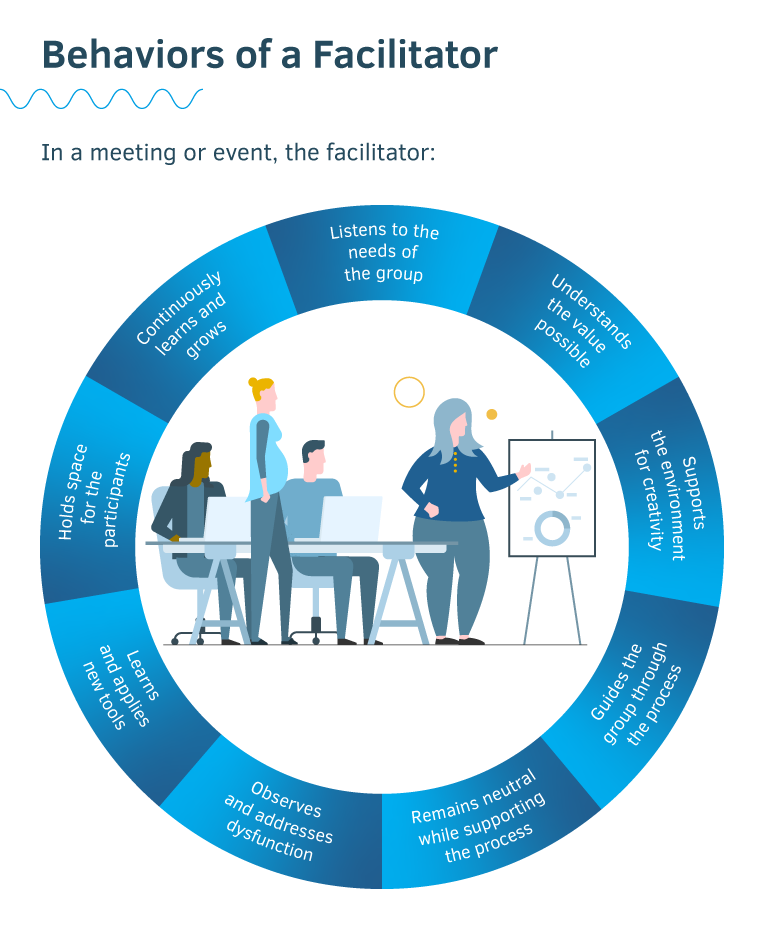Learn about purchasing for teams

You currently run meetings or coordinate large group collaborations: some go well, while others, not so much. You wonder to yourself, what’s the difference between a successful meeting that reaches the needed outcomes and meetings that end with more questions and no resolution? How can you ensure consistently great outcomes for your meetings or large group collaborations?
The mindset and skill of the facilitator determine the outcome of meetings and large-scale collaborations.
So what exactly does a facilitator do, how and why do they have such a large impact on the outcomes of meetings, and how do they develop the mindset and skills needed to become an impactful facilitator?
The Responsibilities of a Facilitator

Let’s use this working definition of a facilitator:
A facilitator is a person who guides a group of people through a process that achieves their client’s desired outcome. Everyone in the group contributes to, understands, and accepts the results because the facilitator supports a process that maximizes participation, creativity, and productivity.
This definition outlines the four fundamental responsibilities of a facilitator. The first is getting crystal clear on the desired outcome of the meeting, workshop, or event. For a great facilitator, this starts with understanding the event’s purpose from your client’s perspective, its importance to them and their organization, and the desired impact beyond the event. A facilitator also needs an understanding of the people participating in the event, event location options, tools and materials available, and any other pertinent information.
All this information is needed to aid a facilitator in their second responsibility, which is creating a process that will:
- Achieve the client’s desired outcome
- Endure beyond the end of the event
The most effective facilitation creates a productive environment that brings out the group’s innate creativity and encourages participation. When people contribute to the outcome of an event, they are more likely to understand the result and agree to carry out plans made during the event.
The facilitator’s third responsibility is skillfully guiding the group through the process they have designed to reach the desired outcome (desired by your client/the meeting owner, not by you - more on this later). This practice is more than just following the designed process. The facilitator must be able to dance in the moment and make adjustments to the process in real time that align with where the group is at and the event's desired outcome.
A subtle yet very important fourth responsibility emerges from the first three: A facilitator remains neutral on the subject matter of the event. The facilitator must believe that the group has all the knowledge, skills, and authority it needs to meet the outcome of the event. If the facilitator has a vested interest in the content of the outcome and does not remain neutral, they will create an environment where the group may feel manipulated and will not accept the event’s results, and will not have the desired impact beyond the event.
Why Skilled Facilitation Is So Valuable
Whoa, wait a minute, some of you are thinking, I’m just running a meeting! This is complete overkill! Let’s find out…
Pick a meeting you’ll run soon that is between 30-60 minutes long and involves a group of people making one or more decisions. For that meeting, answer the following questions:
- Who is the meeting’s client? It could be you, someone else, or even the participant group.
- What is the purpose of the meeting, and what outcomes are wanted from the client’s point of view?
- Why is the meeting important to the client?
- Who is attending the meeting? Is everyone needed to make the decision(s) present at the meeting? Who else needs to be there?
Now think of yourself as the meeting facilitator who is neutral on content and answer the following questions:
- How will you structure the meeting? Time for: opening, discussion, decision making, action planning. Anything else?
- What are a couple of things you can do to create a productive and creative environment for the group?
- What are some strategies you can use to avoid common meeting pitfalls? Such as side discussions, the loudest person doing all the talking, someone not contributing, personal conflict, and any other meeting dynamic you struggle with.
- What is needed for you to stay neutral on the subject of the meeting?
Imagine executing the process you have just devised and reaching the desired outcome of the meeting. How is this different from meetings you’ve run that haven’t gone as well as you want? What similarities are there to meetings you’ve run that have gone well?
A facilitator with a mindset that pays attention to a meeting’s purpose, outcomes, and participants - while also seeking to create a process that is engaging and brings out the group’s inherent creativity - gives rise to great outcomes for every collaborative event the facilitator takes on.
Being a great facilitator goes beyond simply meeting these four responsibilities. There are many skills and tools a facilitator learns so they can design and execute excellent outcomes for meetings and events.
Who Is a Facilitator?
A facilitator is:
- Someone tenacious about understanding the value gained from a meeting or event.
- Someone who believes in the power of collaboration to come to the best outcomes and designs processes around that belief.
- Someone observant of participants’ behaviour, energy, and interactions and can address dysfunctions as they arise.
- Someone who excels at facilitative listening, creating a productive and creative environment and holding that space for people to step into and do their best work.
- Someone who keeps track of the time and where they are in their plan, changing their plan as needed by the participants to reach the desired outcome.
- Someone who continues to evaluate and learn new tools and techniques and how to apply them appropriately to achieve the outcomes they are asked for.
- Someone passionate about their craft, practicing it to the best of their ability, and engaging in continuous learning to support them in their craft.
If you feel inspired to start your journey to being the best facilitator you can be, congratulations! As your mindset and skills for facilitation grow, you will find your career opportunities expanding: In today’s complex and constantly changing environment, people, teams, and organizations require more agility. To be more agile, they need to find new ways to collaborate, make decisions, and pivot when needed. Being a great facilitator is valuable in many emerging roles in agile organizations, such as scrum master, product owner, agile coach, and any other leadership position.

How You Can Grow As a Facilitator
These interpersonal skills can be incredibly hard to master but will ultimately help shape you into a better facilitator, teammate, and employee.
If you’re interested in improving and growing your facilitation skills, we're excited to announce our new course, Certified Agile Facilitator (CAF). This course is taught by experienced practitioners and features live facilitation practice. To learn more about the course and view the learning objectives, click here.










